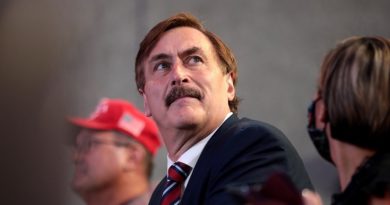Trump’s election lies and the Republicans who corrected him

As Donald Trump sought to overturn the results of the 2020 election, a chorus of top Republicans told him repeatedly that his claims of widespread voter fraud were false.
That pushback now sits at the heart of the federal indictment brought against Trump this week in the Justice Department investigation of his attempts to cling to power.
Special counsel Jack Smith is setting out to show that Trump knew he was lying when he unleashed his torrent of election falsehoods that culminated with the Jan. 6, 2021, riot at the U.S. Capitol — an important part for convicting Trump on the four charges he’s facing.
To that end, the indictment lays out a drumbeat of episodes — many of them already public — when Trump was told that bogus statements about fraudulent ballots being counted or votes being flipped to Joe Biden were false. They came from a range of people in his orbit, including White House lawyers, administration appointees, state GOP officials and his campaign staffers. Trump has denied wrongdoing.
The indictment references at least nine administration officials, among others, who told Trump that the election was not stolen or that his schemes to remain in the White House were untenable. The officials are not named in the indictment, but some of their identities can be discerned by matching descriptions of their activities in the indictment with public reporting. Here are the key people who corrected Trump on his election lies and what they said:
Trump peppered his vice president with false claims about election fraud in the days leading up to the Jan. 6 riot, pressuring him multiple times to use his role in certifying the vote to keep him in power. Per the indictment Pence pushed back in a phone call on Christmas Day. “You know I don’t think I have the authority to change the outcome,” he said.
Days later, Trump told Pence that he had the authority to send votes back in contested states. Pence responded that “he thought there was no constitutional basis for such authority and that it was improper,” according to the indictment.
When Trump claimed there had been a “suspicious vote dump” in Detroit, Barr told him the allegation was false, according to the indictment. He also sought to dispel Trump’s claims that voting machines in contested states had switched votes from Trump to Biden.
On multiple occasions, Trump allegedly summoned Rosen and Donoghue to talk about a video that he and allies said showed election workers at State Farm Arena in Atlanta counting “suitcases” of illegal ballots. Per the indictment they told him that the activity in the footage was “benign,” saying later that investigators had reviewed the tape and had “not identified suspicious conduct.”
In at least two conversations, prosecutors allege that Trump told Rosen and Donoghue that he believed there had been 205,000 more votes than voters in Pennsylvania. “Each time, the Justice Department officials informed the defendant that his claim was false,” the indictment says.
Trump made similar claims per the indictment about Wisconsin that Rosen shot down. Rosen and Donoghue were also among the officials who allegedly told Trump that numerous audits had confirmed that voting machine tallies were accurate.
Ratcliffe, an adviser handpicked by Trump to brief him on national security matters, “disabused” Trump of the notion that “the Intelligence Community’s findings regarding foreign interference would change the outcome of the election,” the indictment says.
Krebs, a Republican chosen by Trump to lead the newly-formed agency, joined a multi-agency statement that said the 2020 election the “most secure in American history” and said claims of computer-based election fraud were unsubstantiated.
On the evening of Jan. 6, 2021, after law enforcement quelled the violence at the Capitol, Cipollone called on Trump to “withdraw any objections and allow the certification” of Biden’s victory, according to the indictment. Trump refused.
Per the indictment Shirkey and Chatfield met with Trump in the Oval Office on Nov. 20, 2020, and heard Trump’s false claims about illegitimate voting in Detroit. They said afterward in a joint statement that they had “not yet been made aware of any information that would change the outcome” in the state.
Yet over the following three weeks, Trump and his allies continued to pressure them to reverse the state’s results.
“We have not received evidence of fraud on a scale that would change the outcome in Michigan,” Shirkey said in a Dec. 14 statement. Chatfield echoed him, saying: “I can’t fathom risking our norms, traditions and institutions to pass a resolution retroactively changing the electors for Trump, simply because some think there may have been enough widespread fraud to give him the win.”
Per the indictment Trump and his alleged co-conspirators claimed in a conversations with Bowers that thousands of noncitizens, nonresidents and dead people had voted in Arizona.
Bowers told them investigations had uncovered no evidence of significant fraud in the state. He said in a Dec. 4, 2020, statement that it would violate his oath of office, “the basic principles of republican government, and the rule of law if we attempted to nullify the people’s vote based on unsupported theories of fraud.”
Trump urged Raffensperger to “find” enough votes to reverse his defeat in the state in an hour-long phone call on Jan. 2, 2021. Raffensperger debunked a number of his false claims, including allegations that thousands of dead people had voted.
“Well, Mr. President,” he said, “the challenge that you have is the data you have is wrong.”
This article has been archived for your research. The original version from The Washington Post can be found here.


